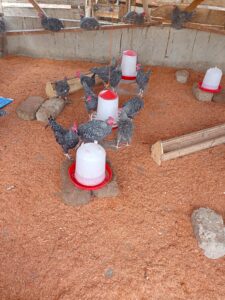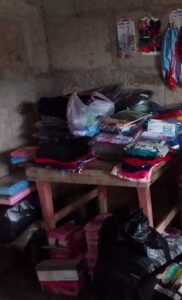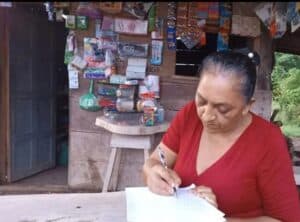
Self-Help Nicaragua Distributes Bio-fortified Beans to Expand to a New Crop
By Jerry Perkins, Self-Help International Board Member

Self-Help Nicaragua Country Director Jorge Campos inspects the five, 100-pound sacks of bio-fortified beans that were purchased by Self-Help from the Nicaraguan Institute of Agricultural Technology (INTA).
On Nov. 12, 2019, I witnessed the first distribution of bio-fortified beans by Self-Help Nicaragua’s agriculture program to farmers from 18 communities at the Los Chiles Cooperative warehouse building.
I was accompanied by Jorge Campos Solis, Self-Help Nicaragua’s country director; Rodolfo Hernández, Self-Help Nicaragua’s agriculture program officer; and Yolanda Fletes, Self-Help Nicaragua’s micro-credit program officer.
When we arrived at the co-op’s building, an assembly of 30 co-op members had gathered for the distribution of the new bean seeds.
Before the beans were distributed, Campos opened the meeting by presenting the farmers with information about the superiority of the Rendidor beans, a variety which was chosen for planting in the Rio San Juan region in southeastern Nicaragua because it is the best variety adapted for a humid tropical climate. He urged them to adopt the innovative “double-row” planting method because that will give them a better yield.
Hernández followed with an informational presentation about the characteristics of the Rendidor beans and the agronomic measures that should be taken to produce the highest yields.

Self-Help Nicaragua Country Director Jorge Campos hands out 15-pound sacks of bio-fortified beans to two women farmers who are members of the Los Chiles Cooperative.
After their presentations, Campos and Hernández set up the scales for measuring the 15 pounds of bio-fortified beans that were given out to each of the 30 co-op members. While the 15-pound sacks of beans were being prepared for distribution, Fletes gave a power point presentation on Self-Help Nicaragua’s Mujeres Emprendadores (Women Entrepreneurs) program. She noted that the business principles contained in the presentation also applied to agricultural pursuits. Although only two of the 30 attendees were women, Fletes held the men’s attention by frequently asking them questions to expand on her presentation and by bringing many of them forward to address the audience with their answers.
When Fletes finished, the co-op members received their 15-pound sacks of bio-fortified beans and signed a receipt acknowledging that they had received the seeds and that they agreed to return 30 pounds of seed to Self-Help after harvest so the distribution process can be multiplied in more communities.
It was very gratifying to see the anticipation and excitement on the faces of the co-op members who received the bio-fortified beans. In this way, the distribution of bio-fortified beans expands Self-Help Nicaragua’s mission to alleviate hunger and malnutrition by helping people help themselves.
What does bio-fortified mean?
By using conventional plant breeding techniques and modern biotechnology through a process called “bio-fortification,” new and more nutritious varieties of basic grains have been developed. These crops also achieve high yields because they have been bred to resist pests and diseases and are adaptable to a variety of production systems employed by farmers in a variety of climates throughout the world.

 Previous Post
Previous Post Next Post
Next Post


